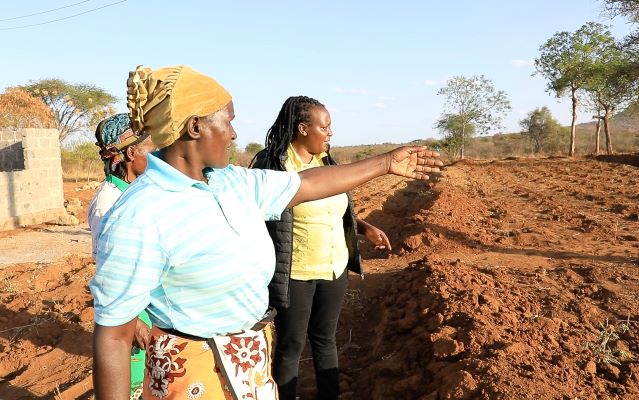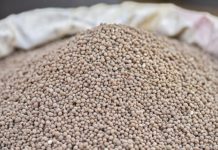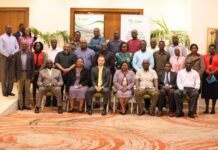The Danish Government has signed a co-financing commitment letter to a Green Climate Fund (GCF) project to invest together with GCF, the Kenya Government, the United Nations’ Food and Agriculture Organization (FAO) and Kenyan banks to support locally-led actions in building climate resilience in Kenyan’s agriculture sectors.
The project that stands to benefit more than half a million farmers through 130 cooperatives and more than 2000 farmers’ groups, and to mitigate 4.2 million tonnes of Green House Gas emissions over 20 years follows the successful project preparatory phase, financed by the Danish Agriculture and Food Council (DAFC), Agriterra and FAO Kenya.
The initiative is aimed at “Transforming Livelihoods through Climate Resilient, Low Carbon, Sustainable Agricultural Value Chains in the Lake [Victoria] Region Economic Block, Kenya” as it seeks to foster the emergence of climate-resilient, low-carbon, environmentally sustainable, and financially viable agriculture value chains by accelerating the transfer of technology, knowledge, assets, and services, and focusing on agri-food cooperatives as key agents to leverage rural change.
This follows a successful submission of the project proposal by Fao to the Fund on 26 July 2023 after Dr. Chris Kiptoo Principal Secretary at the National Treasury of Kenya endorsed the project in a formal, ‘no objection’ letter sent to the GCF Executive Director, Mafalda Duarte on 7 July 2023.
Backing the initiative, the Government of Kenya has pledged USD 14 million in grant co-financing, while the Government of Denmark and FAO have pledged USD 5.7 (DKK 40 million) and USD 1.7 million in co-financing, respectively. The current proposal includes an application for a GCF grant of USD 28.4 million to complete the financing package.
A further USD 10 million in loans from the Kenya Commercial Bank, the Co-operative Bank of Kenya, and Equity Bank will be made available as leverage financing to support climate-smart investments and cooperatives involved in the project. The project proposal will now undergo further scrutiny in a GCF mandatory project cycle process prior to its possible consideration by GCF Board.
Knowledge transfer
The transfer and upscale of technology and know-how on climate-smart agriculture and management practices is a key component of the proposed project, which would be achieved with the support of the DAFC, the Netherlands and Finland – all members of the World Farmers Organization (WFO) – and Agriterra, through the Cooperative Partnership for Climate Smart Food and Forestry, established in 2020.
Agriterra has been identified as a possible project Executing Entity alongside FAO. Operating through the Cooperative Partnership, Agriterra would establish a mechanism for agricultural advisors, cooperative advisors, and front-runner farmers and foresters from Denmark, the Netherlands and Finland, in collaboration with Kenyan colleagues, to inform cooperatives on six value chains: coffee, tea and dairy in the commercial value chain; poultry, African leafy vegetables, and fruit trees in the food security value chain.
Commitment to tackle climate change impacts
FAO Kenya Representative Carla Mucavi said the Kenya Government has a strong commitment in tackling the impacts of climate change. The country has ambitious policies and measures to pursue her low carbon climate resilient development pathway to realize the goal in the Nationally Determined Contributions.
“While smallholders and producer cooperatives may be the most vulnerable to the impacts of climate change, they are critical solutions and change actors to the challenges of climate change in Kenya. They therefore need strong support in both financial and technical assistance.”
FAO Kenya office will work with our partners, under this GCF project, to improve climate resilience and livelihoods of smallholder producers and their organization, and to demonstrate that innovative collaboration is a key to battle with climate change impact to agri-food system.
Need for collaborations
The DAFC CEO Merete Juhl added that Climate change knows no borders. It calls for partnerships, collaborations and exchange of ideas.
“If our ambitions are to have any real significance, solutions must be shared globally. With this proposal for a Green Climate Fund project in Kenya, we seek to deliver on these words. Noting that FAO is an excellent partner. “
“With the Cooperative Partnership for Climate Smart Food and Forestry we have created an instrument to transfer knowhow and technology on climate smart agriculture to the world. Because we do not just cultivate land. We cultivate the climate solutions of tomorrow.”
On his part, Marco Schouten, Agriterra CEO said, “We are thrilled to have been engaged in an intensely productive process of co-creation under the leadership of FAO resulting in submission of a truly important proposal towards GCF, aimed at strengthening over 130 farmer organizations in Kenya. We are eagerly anticipating embarking on its implementation.”









